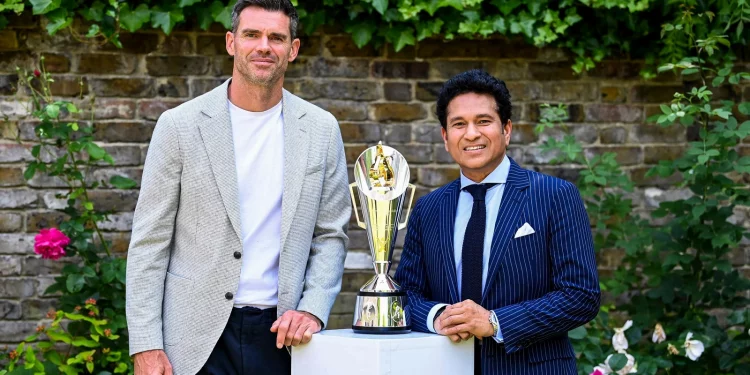The England and Wales Cricket Board (ECB) was recently chastised by legendary Indian batsman Sunil Gavaskar for not inviting Anderson and Tendulkar to the presenting ceremony of the first Anderson-Tendulkar Trophy. India and England’s five-Test series finished in a 2-2 draw. Gavaskar, however, voiced his worries about the two cricket greats’ absence, particularly given that the trophy bears their names.
Gavaskar contrasts being left out of the BGT presentation.
The former captain of India made a comparison to his own experience in Australia earlier this year, when the hosts had won and only Allan Border was there for the Border-Gavaskar Trophy ceremony, while he was left out. A similar idea may have resulted in Anderson and Tendulkar being excluded from the Oval ceremony, Gavaskar said.
“This was the first series ever named after two of cricket’s greatest legends, Jimmy Anderson and Sachin Tendulkar. Given that the series ended in a draw, it would have been expected that both would be present to give the trophy to the two captains. Both were in England at the time, as far as anyone can tell. Were they just not invited, then? Or was this like what happened in Australia earlier this year, when Australia won the series and only Allan Border was invited to award the Border-Gavaskar Trophy? Perhaps neither was invited to the presentation because this England series was drawn,” Gavaskar said in his Sportstar column.
The drawn series demonstrated the folly of trying to make amends with Pataudis: Sunil Gavaskar
England captain Ben Stokes and India captain Shubman Gill photographed next to the trophy themselves, as neither Tendulkar nor Anderson attended the presentation. In the meantime, India bowled the home team out for 367 in a run chase of 374 to win the last Test at The Oval in dramatic manner. The visitors won thanks to Prasidh Krishna’s assistance and Mohammed Siraj’s five-wicket haul. In addition, Gavaskar brought up the Pataudi Medal, which was given to both Stokes and Gill even though the series was drawn. He emphasised that the Player of the Series, not the victorious captain, should receive the medal.
“Administrators are hired primarily to guarantee profits and are skilled at it, but they might not know much about the background of the sport they are overseeing. Therefore, these small acts are not part of their plan. The Pataudi Medal, which was supposed to be given to the captain of the victorious squad, was also not attended by any members of the Pataudi family. The drew series demonstrated the folly of the plan to retire the trophy bearing the Pataudis’ name in an attempt to appease them.
The medal can’t be given out each time the series is drawn, can it? Therefore, wouldn’t it be preferable to give the medal to the Man of the Series instead of the captain of the victorious team? What if the captain himself had a routine series with minimal influence on the outcome? It would have been a difficult decision if there had been an outcome and the Man of the Series had to get the Pataudi Medal because both captains were absolutely exceptional,” he continued.
For his 754 runs in his debut Test series as captain, Gill was voted Player of the Series, and Harry Brook was named Player of the Series for England.







